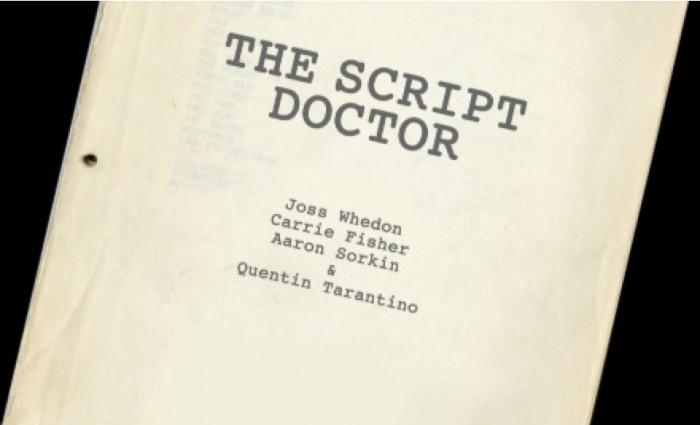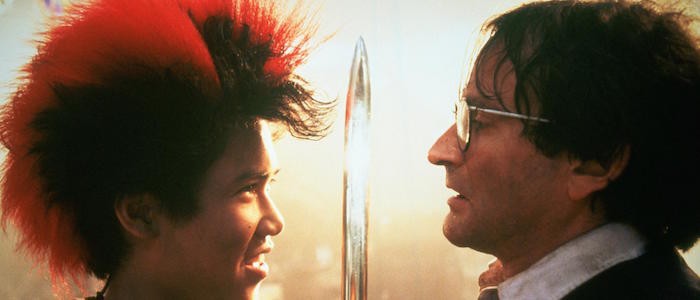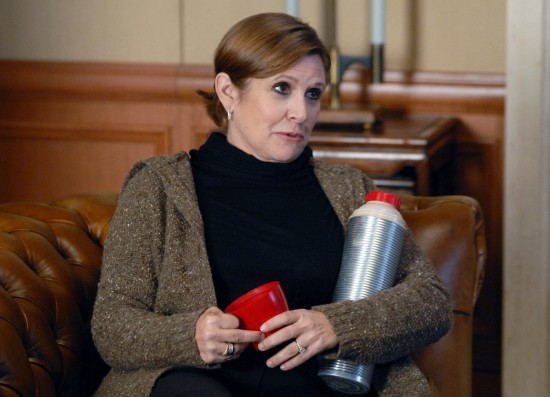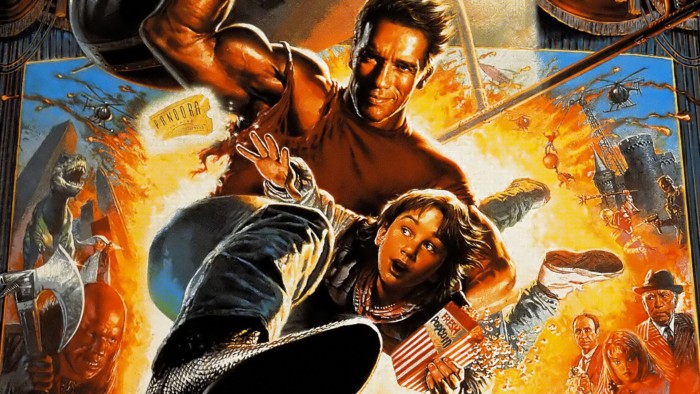Carrie Fisher, Script Doctor: Her Unknown Legacy Examined
This week we've all been thinking about Carrie Fisher, who died earlier this week at the age of 60. While most people know her for her role as Princess Leia in the Star Wars films, a lot of people don't realize that her written career spans farther than the bestselling books and novels that she penned over the years.
Entertainment Weekly once described Carrie Fisher as "one of the most sought after [script] doctors in town." She worked without credit on films ranging from Hook to Last Action Hero to the Star Wars prequels and much more. Learn about her unknown legacy of uncredited work on big Hollywood screenplays in our Carrie Fisher Script Doctor primer.
What Is a Script Doctor?
In the 1990s, Fisher was one of the top script doctors in Hollywood, called in to help fix or improve movies. While most films only feature one, two, or a handful of names in the writing credits, big Hollywood blockbusters often are the work of a lot more uncredited writers who were brought on to polish a character or "punch up" jokes, dialogue, and other story elements. The Flinstones movie reportedly had over 30 uncredited screenwriters.
Notable script doctors include William Goldman, Quentin Tarantino, Aaron Sorkin, David Mamet, Akiva Goldsman, and Frank Darabont. Joss Whedon was a script doctor on many films including Waterworld, Speed, Twister, and X-Men. The screenwriter/filmmaker has said that the call usually comes "when they are making a movie already, and they should not be." Whedon explained that once on board, the script doctor "may face any number of challenges, from 'gosh, this one scene doesn't work,' to 'Wow, this script sucks,' but the basic charge remains the same: connecting whatever dots they already have; it's taking whatever they're wed to and then trying to work something good in between the cracks of it."
Script doctors seldom get credit for their contribution to the project, and a lot of times don't want credit. Sometimes a film is such a mess that the stuff makes headlines, but most of the time these uncredited gigs go completely under the radar. So when someone like Rian Johnson gets brought in to rewrite ADR for a film like Gareth Edwards' Godzilla, you usually never hear about it. But stuff like that happens all the time.
In doing research for this piece, it was hard to find much information about Fisher's script doctor work, and that's typical. What follows is a compilation of information from all the quotes and sources I could cobble together.
How Carrie Fisher Became a Script Doctor
So you might be wondering how Carrie Fisher, an actress known best for her performances in the Star Wars movies, became one of the most sought-after script doctors in Hollywood. Carrie told the Phoenix New Times that she got into script doctoring when she was asked to adapt an interview she did for Esquire into a movie:
I read mostly fiction and then it went to obligation. I was asked to write a book based on an interview I did for Esquire. I was asked to write a nonfiction book and I didn't. [Laughs] I was asked to adapt that book and then I started doing re-writes.
You can read the 1985 Esquire interview she mentions here. Fisher admits that being a script doctor is "a good job, but that is a job I did not look to get." But it probably really all began, as much of Fisher's career, with George Lucas' little space movie.
Rewriting Star Wars
Fisher, like some actors, would eventually rewrite the dialogue in a lot of the movies she starred in. This practice started on the Star Wars movies. Harrison Ford was rewriting a lot of his dialogue and Fisher said it "became annoying because it impacted my stuff."
It is easier as an actor to go into rewriting because you know what would fit into your mouth dialogue wise. We would tell George Lucas, "You can type this shit but you can't say it."
By Return of the Jedi, Fisher says she was rewriting a little bit of Princess Leia's dialogue. It's probably worth noting at this point that an image of a script page for Empire Strikes Back featuring handwritten notes has been circulating the web recently, but those notes were not written by Carrie Fisher as claimed by many sites.
George Lucas must have liked the uncredited dialogue revisions Fisher did on the set of Star Wars because he asked Fisher to write an episode of the Young Indiana Jones Chronicles. Fisher has even said that Lucas asked her to punch up the Star Wars prequels, although I can't find her on record talking about her contributions beyond confirming her involvement. It has been reported that she provided some rewrites on The Phantom Menace, Attack of the Clones and Revenge of the Sith.
How Carrie Fisher Got Hooked By Spielberg
But as for her screenwriting career, that began with a book. After a drug overdose, Fisher wrote the 1987 novel Postcards from the Edge, a semi-autobiographical story of a substance-addicted actress who tries to look on the bright side even as she is forced to move back in with her overbearing actress mother. Fisher adapted the book into a movie, released in 1990 and starring Meryl Streep, Shirley MacLaine, and Dennis Quaid. It was nominated for two Academy Awards and three Golden Globes.
I wrote Postcards and based on that I was asked to rewrite Hook. They told me they wanted me to rewrite Tinkerbell's part, but if Tinkerbell interacts, you're writing scenes.
Fisher was uncredited for rewriting comedic dialogue for Julie Roberts' Tinkerbell character. Hook screenwriter Jim V. Hart explained in Steven Spielberg: A Biography that "Steven tends to use writers like paintbrushes, he wants this writer for this, this writer for that. The joke was that everyone in town who had his fax number was writing for it." Regardless, Hook launched Fisher into a career of doing uncredited writing gigs all around Hollywood.
Fisher has said that she enjoyed working with Steven Spielberg on Hook because it was "just nice being treated with a different kind of respect than certainly you would be as an actor." But she didn't seem to like the project much, telling Jonathan McNamara that she "took another rewrite job" just "to get off of that."
So it just went from Hook to whatever. Sister Act. Lethal Weapon 3. The River Wild. Some really bad ones too.
We will learn about all the and more, as we continue this Carrie Fisher script doctor primer.
The Art of Script Doctoring
Fisher quickly became known as a script doctor who could flesh out female characters and add some sharp humor to dull dialogue exchanges. WebMD once asked Fisher what it takes to heal bad dialogue, and her response was "Make the women smarter, and the love scenes better." Fisher explained to the Columbus Dispatch that she is "a good script doctor because I respect the original tone or dialect of the original and try to rewrite it according to what it is already."
I write good love scenes and I write good women. I have good lines in different films... There's usually not a lot of me in it, just some line I put in it. Sometimes I forget which movies I did and then they'll come on TV.
Asked which of her script doctoring work she was particularly proud of, Fisher has cited 1994's The River Wild, "because it was taken on right after I split up with Bryan [Lourd]. That was, not therapeutic, but distracting, at least."
There were a lot of ones that I had fun on. The Wedding Singer. ... My favorite films are ones that have my lines in it, and I like those lines. And I like to hear them.
Sister Act to Action Blockbusters
Fisher was brought on board for Sister Act by Whoopi Goldberg herself, reportedly to help "Whoopify" the female-led project. EW has a great time capsule article from 1992, which features Whoopi angrily yelling into her car phone with Fisher on the other line about then-head of Disney (now head of Dreamworks Animation) Jeffrey Katzenberg. Apparently, Fisher not only helped doctor the script but also served to maintain the comedian's relationship with the studio. It's a fun read.
Goldberg was impressed by what Fisher brought to Sister Act, which became a huge success with Whoopi and co-stars being nominated for their comedic performances. Fisher later did some script doctoring work on Goldberg's 1993 film Made in America, which was a critical failure but made significant money internationally.
For Outbreak, Fisher was one of a couple of screenwriters brought on board to help improve the screenplay. It was reported at the time that she was being paid $100,000 per week for her work.
And after Sister Act, Fisher was being sought after by the biggest blockbuster movies of the time. She was called in to rework Rene Russo's character and dialogue in Lethal Weapon 3, before being hired for Last Action Hero. The original screenwriters were removed from the project, replaced with Shane Black. But the studio reportedly wanted someone to bring "a woman's touch" to the mother/son relationship in the film. So Fisher came on board to revise Mercedes Ruehl's character's dialogue and the parental relationship.
Shane Black, who was the first writer hired to rewrite Zak Penn and Adam Leff's screenplay, has said that back in the 1990s, high-priced script doctoring "was an insurance policy for keeping your job at an executive level." Black has explained that:
A script would be questionable and the trembling executive would give it to a famous writer with a million bucks, so he could say, 'Yeah, it's fortified now. We've given it vitamins. Wait, wait, wait... It needs the woman's touch. Give it to Carrie Fisher!' It just made people breathe easier, throwing money at this enormous behemoth. Even if the movie sucked, now they could say, 'It's not our fault.'
Very Funny
After being hired to co-star in the Adam Sandler romantic comedy, Drew Barrymore says that Fisher was brought on board The Wedding Singer to "write the girl's part to make it balanced." Judd Apatow and Adam Sandler also did uncredited rewrites on that script. The video above talks about how Fisher's version of the script was notably different from the final film, including an alternate ending.
Fisher worked on a bunch of comedies in the 1990's, including doing a rewrite on So I Married an Axe Murderer when Chevy Chase was originally set to star. Her signed contract recently sold on eBay. In 1994, Fisher did a rewrite of Intolerable Cruelty, although it's not known if any of her work remained after the Coen brothers rewrote it for their 2003 film.
What follows were some of the projects that probably fits into Fisher's classification as "some really bad ones." Those movies included Milk Money (1994), My Girl 2 (1994), Love Affair (1994), The Mirror Has Two Faces (1996) and The Out-of-Towners (1999). Not all films can be saved.
Fisher worked with Harvey Weinstein on a bunch of movies, including Scream 3, in which Fisher wrote a cameo for herself. In the film, she played Bianca Burnette, an actress who is mistaken as Carrie Fisher. As you can see in the clip below, Fisher's character jokes, "Yeah, I was up for the part of Princess Leia. But who gets it? The girl who slept with George Lucas!" Fisher also worked on 2000's Coyote Ugly, 2001's Kate & Leopold, and 2005's Mr. and Mrs. Smith.
Why Carrie Fisher Stopped Doctoring Scripts
So after doctoring scripts for nearly two dozen movies over the course of one decade, why did Fisher suddenly stop? According to Fisher, the bureaucracy of the process became too much work. In a 2011 interview with AV Club, Fisher explained why she stopped doing script doctor work in the early 2000s:
Probably there are still people who get the job without having to jump through hoops, but there's more hoop-jumping now. As maybe there should be, because it's a very lucrative thing to do, but I don't like the hoops. And you wouldn't either, as a writer. They say, "Well, what would you do if you got this job?" So basically, you're giving them your ideas, you're giving them your writing [for free]. And then generally, they go, "Nah, we found someone else." And they probably always wanted that someone else. ... So I don't want to play, and they still have tried to engage me. They still are like, "You essentially have the job. You just have to come in and talk to them." And you don't! It's bullshit. I don't like being treated like that, and no one does, but I have a particular thing about it.
She told Newsweek in December 2008 that "younger people came to do it and I started to do new things."
It was a long, very lucrative episode of my life. But it's complicated to do that. Now it's all changed, actually. Now in order to get a rewrite job, you have to submit your notes for your ideas on how to fix the script. So they can get all the notes from all the different writers, keep the notes and not hire you. That's free work and that's what I always call life-wasting events.




